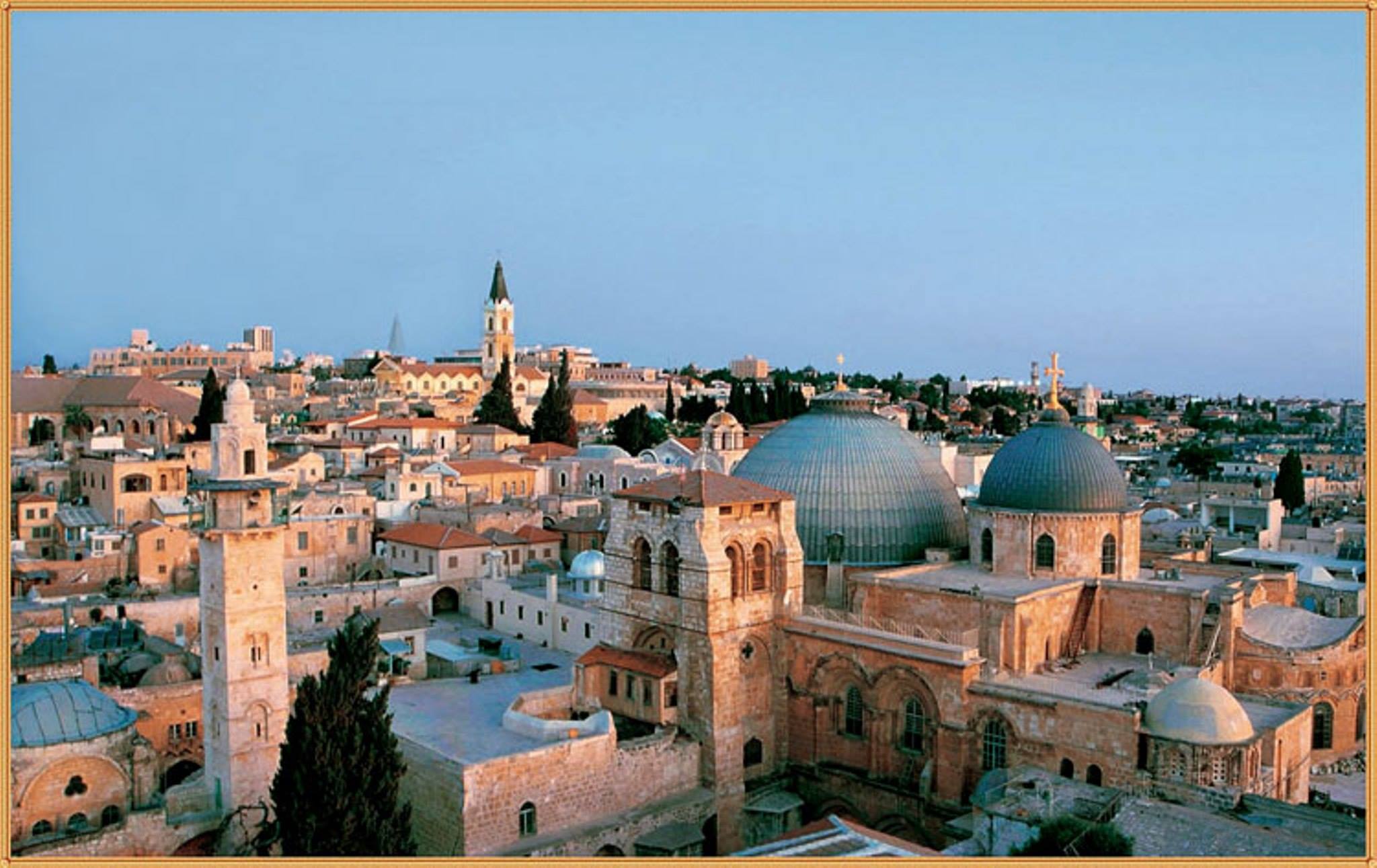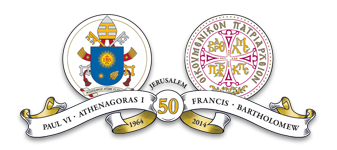Patriarchate of Jerusalem

By Anna Koulouris, Greek Orthodox Patriarchate of Jerusalem
The Church of Jerusalem, which is biblically speaking, the "Mother of all Christian Churches," was elevated to the rank of Patriarchate in the year 451 at the Fourth Ecumenical Council held in Chalcedon. At that time, almost all of the Christians in Palestine were Orthodox and by the 7th century all Christian holy places were Orthodox controlled. As the only local and autocephalous Christian institution in Israel, the Patriarchate heads the various Christian communities throughout the Holy Land and is looked to as the representative and spokesperson on Christian affairs. Part of this responsibility includes not only stewarding the holy places, but tending to the spiritual and practical needs of the entire flock, both local and from all around the globe.
While the Patriarch's full title or fimi is "Patriarch of the Holy City of Jerusalem and all Palestine, Syria, Arabia, beyond Jordan, Kana of Galilee and Holy Zion," his jurisdiction falling under the political domain of the Hashemite Kingdom of Jordan, Palestinian Authority and Israel obliges him to cooperate with demands of those government authorities in order to maintain legal recognition. No other Church in the Holy Land is in a comparable position. For this reason, and its historical legacy that has given it a preferential status in Jerusalem for ages, the Patriarchate enjoys certain rights and privileges, yet it also faces heavy pressures. Some of these pressures include being pulled into conflicting political interests as a result of this jurisdiction that spans three national territories.
The foremost aspect of the Church's mission is liturgical and pastoral, and is concerned with tending to the needs of the flock. The uniqueness of the Patriarchate of Jerusalem is that it fulfills its local pastoral mission, teaching and living out the Gospel, in those very places where the events of the Gospel occurred. Attached to this privilege is the immense responsibility of safeguarding the holy places, and from here, the need for the Brotherhood of the Holy Sepulcher arises. All members of the Brotherhood of the Holy Sepulcher, i.e. patriarch, hierarchs, archimandrites, presbyters, deacons, monks and even novice monks, are called "Hagiotafites," which literally means "Guardians of the Holy Tomb." Through centuries of challenges and oftentimes in the face of death, the Brotherhood of the Holy Sepulcher has guarded the world's holiest Christian and Jewish sites. The Brothers, numbering about 100, serve in almost every shrine. Every day of the year, especially on feast days, services are held in the shrines for the monks, locals and pilgrims. Some members of the Brotherhood also take on pastoral responsibility, leading parishes for the local congregations along with the Arabic-speaking priests.
The Brotherhood of the Holy Sepulcher has also succeeded in keeping the holy places accessible to all pilgrims without differentiation. It is locally and internationally understood that without the presence of the Patriarchate, most of the holy places would have been either destroyed or converted into museums, archeological sites or tourist attractions.
The people in the jurisdictional realm of the Patriarchate are within the historical bounds of the three Roman and Byzantine Palestines, which today are equivalent to the territories of Israel, Jordan, the Palestinian Autonomy and the Emirates. Their congregations number about 450,000 and include Palestinians, Russians, Greeks, Jews, Romanians, Serbians, and Georgians, of whom Palestinians and Russians are the majority. The Orthodox Palestinians number about 60,000 in Israel, 80,000 in Jordan, and 30,000 in the Palestinian Autonomy. Their numbers continue to decrease at an accelerating rate, not only as a result of the political strife of the region, but also as a result of the activity of other Christian denominations.
Dedication in its mission to the people within its jurisdiction can present many challenges, considering the Patriarchate is located at the heart of a land that is often synonymous with conflict. Challenges of the 20th century greatly affected the congregation of the Patriarchate, most significantly World War II, the War of 1948, and the Six-Day War. The economic consequences of these wars drove many Greek and Palestinian members of the Church to leave their homes. The political developments of this past century have resulted in the members of the Church of Jerusalem living in various regions, which complicates the pastoral work of the Patriarchate. The on-going Israel-Palestine conflict has affected the Patriarchate as it has affected the Israelis and Palestinians, leaving it in the problematic position of answering to every side. However, the Patriarchate is resolute in remaining a religious institution rather than a political one, and in doing so urges all sides of the conflict to come to a solution through peaceful negotiation. The Patriarchate respects the national aspirations of both sides, but does not condone the use of violence by either, and will play a part in reconciliation as much as it is possible.
One of the most important aspects of the Church's overall mission, which the Patriarch works at assiduously and believes is a key to future generations and the advancement of the region, is education. The Patriarchate's many schools throughout the Holy Land educate young people, often times paid in full by scholarship, regardless of ethnic or religious background. They are the oldest schools functioning in the Holy Land, having existed since the time of the Ottoman rule. In addition to educating thousands of students, the Patriarchal schools have helped resolve a general unemployment problem by providing qualified individuals with teaching positions, especially in Jordan where they are considered the top schools in the nation and are continuing to grow.
In addition to its learning institutions, the Patriarchate maintains a vast library of books and ancient manuscripts, which document the history and spiritual standard of the Church throughout the ages. The Patriarchate welcomes scholars from around the world to use these precious archives for various academic and religious projects.
Due to its status as the oldest and only local Church in Holy Land, the Patriarchate is responsible for representing all Christianity in the region. For this reason, it includes in its mission the cultivation and maintenance of good relations with the other Orthodox Churches with which it shares full ecclesiastic communion, as well as dialogue and cooperation with the other denominations. In its dedication to strengthening ties with the other Orthodox Churches, the Jerusalem Patriarchate takes on a role of leadership in the World Council of Churches, the Middle East Council of Churches, and initiates and participates in ecumenical dialogue, which it views vital to the health of the entire Christian world.
History has presented the Patriarchate with monumental challenges to surmount, including the Persian invasion, centuries of Islamic rule, and the brutal Crusader period. Its rehabilitation after the Mamluk rule was a time for reasserting control over many Christian holy places and establishing more churches and monasteries in today's Gaza, Beit Jala and Beit Sahur. Greek Orthodox Christians were classified and recognized by the Ottomans as millet-i-rum, meaning a semi-autonomous monolithic group. This classification gave the Patriarchate a source of authority, which is also why the Patriarchate continued to actually own all its public properties of the Greek Orthodox community within its jurisdiction. The Ottoman Sultan would issue an Imperial decree with the election of each new Patriarch, which outlined the Patriarch's authority, including his authority over real estate. The Greek Orthodox Patriarch was the titleholder and administrator of all lands registered in his name, as well as all those registered under the name of the Orthodox community. This explains the Patriarchate's control of the Orthodox communities' public properties in Israel, the Palestinian Authority, and Jordan until today.
The power of the Greek Orthodox Patriarchate continues to lie in the important and long-reaching role it has played throughout history. It is not just that the Patriarchate holds a special status in Jerusalem, but rather, that it is an actual piece of Jerusalem, inseparable from any fathomable future of this city and of the Holy Land at large. Today, the relationship between the Patriarchate of Jerusalem and the states within its jurisdiction is a good one. When political tensions arise, the Patriarchate does not interfere, holding to its exclusively spiritual mission. However, when the people of the region are negatively affected political circumstances, the Church steps in on a humanitarian level.
Since it is an institution local to the Holy Land, which focuses its attention on not on the holy places but also on the flock, the Patriarchate offers financial assistance to people in need, scholarships to students of any ethnicity and religion, and sends representatives – often the Patriarch himself – to visit refugee camps to give aid and spiritual support. The Patriarch also speaks on behalf of the Christian community at public forums, conferences, and private diplomatic meetings, acting as the voice they so desperately need in a time of uncertainty and tribulation for Christianity's geographical birthplace.
Visit the website of the Patriarchate
of Jerusalem.
Related Assets:

